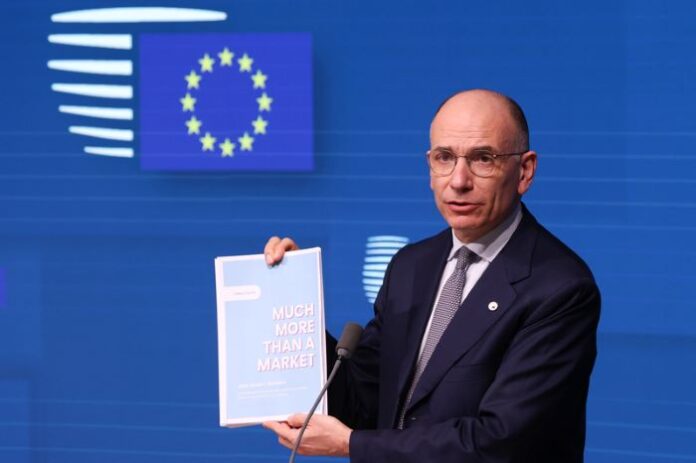The European Union is starting to debate a new European Competitiveness Deal to help the bloc catch up with the US and China in crucial industrial sectors and work together as a group. However, EU leaders are still undecided about possible ways to finance their ambitious plans.
Former Italian Prime Minister Enrico Letta illustrated a report on the shortcomings of the current state of the EU single market for EU leaders, highlighting how Europe needs to act fast to close the gap.
“We’re in danger of falling out of touch. There is no time to waste. The gap between the European Union and the U.S. in terms of economic performance is becoming bigger and bigger,” Letta said while presenting the report. Data backs him up, as gross domestic product per capita increased by less than 30% in the EU in the past 30 years, as opposed to almost 60% in the US during the same period.
A key solution to help spearhead the deal could be the EU capital markets union, a much-maligned solution that has been debated for over a decade, with member states uneasy about the prospect of giving away financial control. Capital markets union should become effective by 2029 but there are still many obstacles about implementation.
The Netherlands, France, and Germany seem keen on moving forward, with Paris and Berlin really pushing for it. However, smaller countries like Luxembourg, Malta, Estonia, and Ireland are less convinced about a fast implementation. The latter two countries also voiced concerns about harmonising corporate taxes, as German Chancellor Olaf Scholz called for an end to special supervision and tax regimes.
“I’m yet to be convinced around the need for an overly intense emphasis on centralisation of those functions,” said Irish Prime Minister Simon Harris, talking about capital markets union in general.
European Council President Charles Michel urged to go through with capital markets union, saying that it is “fundamental” and that the EU needs to “increase the capacities of the European Investment Bank to invest in strategic sectors.”
Michel also underlined the paradox that “a substantial part of these savings leaves the European Union and is not mobilised to support the economic base, to support innovation, to support the technological base,” a sentiment echoed also by French President Emmanuel Macron. He said that “Europe has more savings than the United States of America. And every year, around 300 billion euros of these savings go to finance the American economy.”

